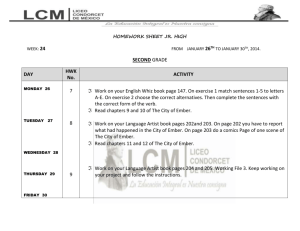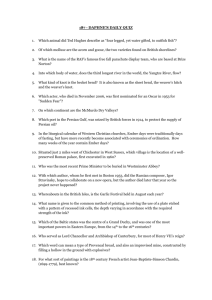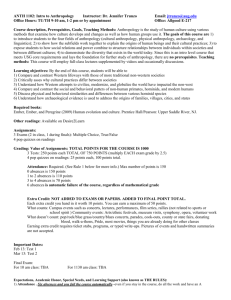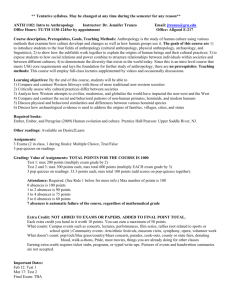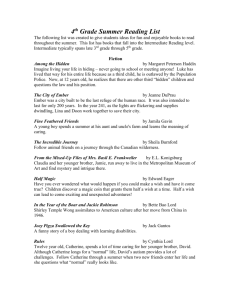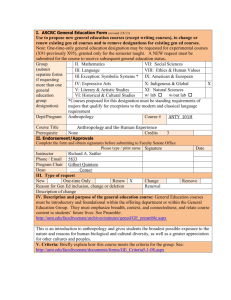Syllabus
advertisement
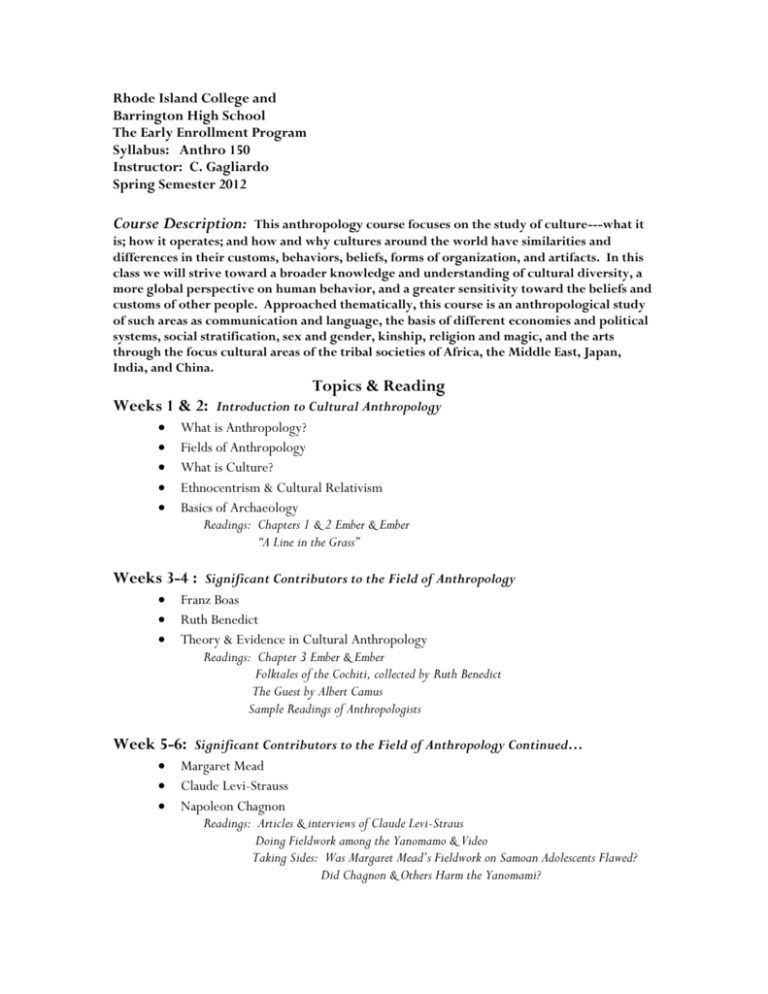
Rhode Island College and Barrington High School The Early Enrollment Program Syllabus: Anthro 150 Instructor: C. Gagliardo Spring Semester 2012 Course Description: This anthropology course focuses on the study of culture---what it is; how it operates; and how and why cultures around the world have similarities and differences in their customs, behaviors, beliefs, forms of organization, and artifacts. In this class we will strive toward a broader knowledge and understanding of cultural diversity, a more global perspective on human behavior, and a greater sensitivity toward the beliefs and customs of other people. Approached thematically, this course is an anthropological study of such areas as communication and language, the basis of different economies and political systems, social stratification, sex and gender, kinship, religion and magic, and the arts through the focus cultural areas of the tribal societies of Africa, the Middle East, Japan, India, and China. Topics & Reading Weeks 1 & 2: Introduction to Cultural Anthropology What is Anthropology? Fields of Anthropology What is Culture? Ethnocentrism & Cultural Relativism Basics of Archaeology Readings: Chapters 1 & 2 Ember & Ember “A Line in the Grass” Weeks 3-4 : Significant Contributors to the Field of Anthropology Franz Boas Ruth Benedict Theory & Evidence in Cultural Anthropology Readings: Chapter 3 Ember & Ember Folktales of the Cochiti, collected by Ruth Benedict The Guest by Albert Camus Sample Readings of Anthropologists Week 5-6: Significant Contributors to the Field of Anthropology Continued… Margaret Mead Claude Levi-Strauss Napoleon Chagnon Readings: Articles & interviews of Claude Levi-Straus Doing Fieldwork among the Yanomamo & Video Taking Sides: Was Margaret Mead’s Fieldwork on Samoan Adolescents Flawed? Did Chagnon & Others Harm the Yanomami? Week 7-8: Aspects of Evolution The Living Primates The First Hominids Readings: The First Humans Are We So Different? Videos: Archaeology Techniques Gorillas in the Mist Week 9& 10: Communication & Language What is communication? Origins of language Linguistics as an occupation Connections between language & culture Dialects Folklore & Folktales Focus Cultural Areas: South American tribal societies African tribal societies (Masai, Ashanti, Zulu, Mbuti, !Kung) Readings: Chapter 4 Ember & Ember Selected readings on societies Video: Secrets of the Wild Child Body Perfect Week 11: Making a Living Food Collection & Production Distribution of Goods & Services Adaptation of Tribal Societies Readings: Chapters 5 & 6 Ember & Ember Selected Readings Week 12-13: Social Stratification Social equality variations Egalitarian societies Rank societies Class system Caste system Slavery---Old World vs. New World Focus Cultural Areas: India (Brief Physical Environment, Selected History, Family & Class) Readings: Chapter 7 Ember & Ember Arranging a Marriage in India by Serena Nanda A Pariah’s Life by Viramma Girabala by Mahasweta Devi Video: Born into Brothels Week 14-15: Sex & Gender Gender roles Female roles in leadership & warfare around the world Personality differences Sexuality Focus Cultural Area: Japan (Brief Physical Environment, Selected History, Daily Life and Values) Readings : Chapter 8 Ember & Ember Kimono by Liza Dalby Japanese Marriage Taking Sides: Do Sexually Egalitarian Societies Really Exist? Should anthropologists interfere with Cultural Practices? Week 16-17: Marital Relationships & Kinship Define marriage Why is marriage universal? Restrictions on marriage---to whom, how many Family construction Kinship Focus Cultural Area: Middle East (Brief Physical Environment, Selected History, Family & Class Structure) Readings: Chapter 9& 10 Ember & Ember A Look Behind the Veil by Elizabeth & Robert Fernea The Prisoner’s Dilemma by Steven Chapman When Brothers Share a Wife Week 18-19: Religion & Magic Universality of religion Similarities & differences in belief structure Supernatural forces & beings Life after death Magic---sorcery, witchcraft, etc. Types of Practitioners Focus Cultural Areas: Belief Systems of the World Readings: Chapter 14 Ember & Ember The Secrets of Haiti’s Living Dead by Gino Del Guercio Looking for a Rain God by Bessie Head Videos: After Death, Witchcraft Week 20: The Arts Body decoration and adornment Music Writings Variation in the Arts Viewing art of other cultures Readings: Chapter 15 Ember & Ember (Additional Supplemental Readings Text Cultural Anthropology (Ember & Ember) In addition to text many supplemental readings used. Assignments All assignments are due at the beginning of the period. Formal assignments (essays, papers) must be typed. This does not include homework. All assignments should be completed as neatly as possible. If you are absent the day of a test, you will take the test the day you return to school. Please see me for clarification. If you are absent the day a project is due you will still present it to the class the day you return to school. You may always hand in a project early, but never late. For all assignments please use the following heading: NAME DATE PERIOD ASSIGNMENT NAME Major Projects Debates-There will be 2 debates on relevant cultural topics held during the semester. One debate will take place during the introductory unit while the second will be held during the Sex & Gender unit. Debate groups will consist of approximately 3-4 people. Research Presentations-Students will be asked to do 1 research presentation for this course. One will be done in the Communication & Language Unit. Socratic Seminar-Students will be asked to participate in a Socratic seminar. One will be done during the Religion and Magic unit. Weekly Anthro Abstracts-Students will be asked to summarize an Academic Journal Article related to the field of Anthropology on a weekly basis. See instructor for guidelines. Grading Quarterly assessments will occur on a variety of assignments including writing, discussion responses, public speaking, group work, outside reading, tests, quizzes, presentations, and participation. Your grade will be calculated as follows: Projects 35%, Tests 30%, Quizzes 20%, Homework, 10%, Class Assignments, 5%. Late assignments will be deducted 10 pts for every day late. The majority of this class is discussion based. It is required that you actively engage in class discussion. Many of the topics we will discuss are of a mature nature. It is important to remember that this course is for educational purposes and in order to acquire new knowledge about various cultures we must remain open-minded & respectful. Please see me if you have questions and/or concerns about your grade (Do not see me for this during class time). Rules Be on time for class! Be in your seat and ready to work when the bell rings. Be prepared for class! Bring your materials to class everyday. Be respectful! Show respect for everyone and everything. No cell phones, etc. in class! The teacher dismisses the class not the bell. Cheating is a very serious matter. Both parties involved will get a "0", and the Main Office will be notified. A letter will also be sent home to your parents and/or guardians. Plagiarism from another student's work is cheating. Copying from a textbook, the Internet, or another source that is not your own without citations is cheating. You will receive a "0" and no make-ups will be given.
